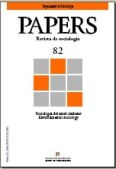Consumo y medio ambiente en el País Valenciano (1980-2000)
Article Sidebar

Main Article Content
Ernest García
At the end of the 1970s, after more than a decade of intense economic development, some marks of the mass consumption model were engraved in the Valencian society: a commercialisation system increasingly dominated by large corporations which trade in worldwide markets and use massive advertising; an animal-protein based diet, with products imported from far-away countries, with a strong presence of highly processed and packaged food and beverage; mobility based on cars; preference for owned housing, sub-urbanisation tendency, and growing energy use; «use-and-dump» culture defined by short life of products and high production of waste. This consumption model is highly homogenous and indicates the style of living for all social groups (with the exception of the very poor). Its features have accentuated along time. The article gathers some data (1980-2000) which support this statement. These data correspond to diet, transport, housing and waste production -four aspects of life which are strongly significant from an environmental point of view. The trend toward a greater environmental unsustainability is triggered by the evolution of productive structures and commercialisation networks, and the spreading of the cultural features of modernisation. As the more «modern» consumption practices and habits become a model to imitate with an influence on all social strata, in the Valencian society this sphere of life points at an «anti-environmental modernisation».
Article Details
How to Cite
García, Ernest. “Consumo y medio ambiente en el País Valenciano (1980-2000)”. Papers: revista de sociologia, no. 82, pp. 97-120, https://raco.cat/index.php/Papers/article/view/57983.
Most read articles by the same author(s)
- Ernest García, Sociologia del desenvolupament i límits ecológics , Papers: revista de sociologia: 1990: Núm.: 34 Estat del benestar i desigualtats socials